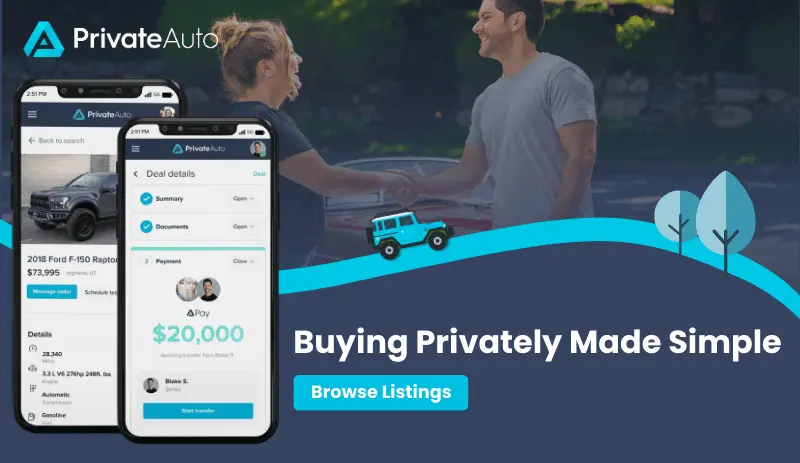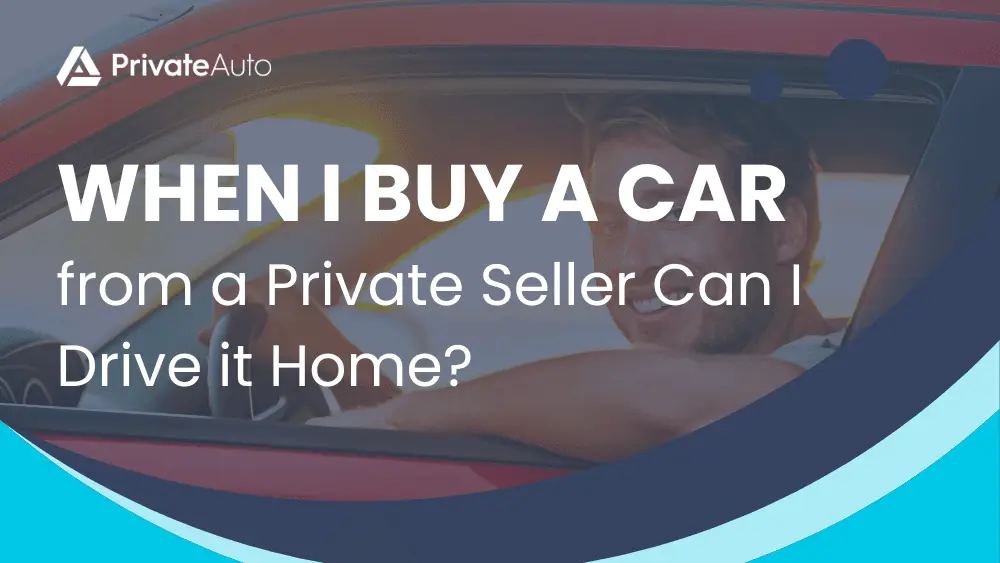How do I get my car home legally?
How Do I Get a Car Back Home I Bought From a Private Seller?
1. Have it shipped to you. Auto transport is convenient and more affordable than you’d expect. Especially for long-distance purchases, shipping can be the easiest option.
2. Drive it. In most states, you’ll need to have temporary registration and/or temporary license plates, and insurance coverage. Talk to your local DMV in advance of the purchase. They can tell you what you need to do.

Should I ship my car?
How Does Car Shipping Work?
Our RunBuggy integration brings fast, reliable transport into the PrivateAuto ecosystem. When you shop used cars for sale and find the perfect one, you can schedule shipping as part of the dealflow.
Here’s how it works:
1. When you start a PrivateAuto deal, you can get an instant car shipping quote right in the PrivateAuto app.
2. Place your car transport order and specify pickup and dropoff locations.
3. RunBuggy picks the car up. You can stay up to date on its location in your PrivateAuto dashboard.
4. Your car gets delivered. All transport is covered by insurance.
Learn more in our complete guide to car shipping.
Do I Need Car Insurance?
Regardless, your insurance agent will be able to help you be compliant with your state’s requirements.
If you don’t have insurance already—or if you’re thinking of switching providers—you can compare multiple car insurance quotes and get coverage within the PrivateAuto app.
What paperwork do I need?
What Paperwork Do I Need to Handle?
1. Certificate of title
2. Bill of sale
3. Odometer disclosure
Check what paperwork is required in your state.
Title
When the seller signs the title to you, double-check that the vehicle information number (VIN), make, model, year, and mileage on the title match the actual vehicle. This prevents title fraud—and clerical errors that can cause trouble for you later.
Bill of Sale
PrivateAuto makes it easy with an official bill of sale right in our app, tailored to your state. You and the seller review the details, and then digitally sign the bill of sale. No printing or scanning; simply sign electronically in the app. It’ll always be there as a reference.
Odometer Disclosure
What do I need to do after buying the car?
What To Do After You Buy a Car From a Private Seller?
1. Get used car insurance
2. Transfer the title
3. Register the car under your name
4. Get new license plates
Title Transfer and Registration
Bring documentation such as the signed title, bill of sale, proof of auto insurance, and your ID to the DMV.
The DMV will update their records and provide registration documentation in your name.
Get New License Plates
How Do I Avoid Fraud When Buying a Car?
PrivateAuto offers vehicle history reports with all premium listings and also has identity verification. These measures cut down significantly on fraudsters, but it always pays to be vigilant.
Don’t let a seller rush you into accepting a high price or paying without verifying the details and test driving. If a seller gives you a high-pressure “act now or lose out” ultimatum, it’s best to walk away. If the car is priced fairly, there will be other listings available without undue seller pressure.
Take your time: inspect the car, verify the VIN, test drive the vehicle, and don’t send payment until the seller has signed the bill of sale and you feel good about the entire arrangement.

Find your Dream Vehicle on PrivateAuto
Here’s the PrivateAuto car buying process:
- Browse used cars for sale on PrivateAuto.
- Make an offer
- Meet up for the test drive
- Inspect the car
- Sign the bill of sale
- Send payment: PrivateAuto Pay lets you send up to $1M instantly with no transfer fees.
- Register the car, get license plates, and transfer the title
- Enjoy your car.
Want to sell your car? Create a listing on PrivateAuto and connect with buyers today!
Buying a Used Car FAQ
What paperwork is needed to buy a car from a private seller?
Check your specific state laws to ensure you get all the mandatory paperwork when buying privately. This documentation is crucial to legalizing the ownership transfer.
Here are some common documents that are typically needed:
– Bill of sale
– Vehicle title
– Registration
– Release of liability
– Odometer statement
– Proof of auto insurance
– State ID
– Inspection forms
What is the best place to buy a car from a private seller?
PrivateAuto is the world’s only transactional automotive marketplace that provides the infrastructure and tools to transact securely. Other so-called “marketplaces” are actually just “meetingplaces”; they connect a buyer and a seller, but don’t support the transaction.
PrivateAuto is far and above the best car-buying app, but what if you don’t find the car you want? Maybe your perfect vehicle is listed on Craigslist, Facebook Marketplace, or CarGurus.
No problem. Find a car on another platform, then hop over to PrivateAuto to conclude the deal securely and quickly. Our DealNow gives you PrivateAuto’s seamless transaction support. Built-in tools like verified identities, legally binding documents, and lightning-fast payments up to $1 million.
So if your dream car pops up somewhere else, no problem! Use DealNow to wrap up the deal conveniently and safely. PrivateAuto’s first-of-its-kind transactional tools enable smooth purchases regardless of where you discover the ideal set of wheels.
What are the tax implications of buying a car in cash?
Unless you live in a state without sales tax, you’ll need to pay sales tax on your vehicle purchase. Other than that, there aren’t a lot of tax implications when buying a car—whether you pay cash or choose to finance it.
Here’s what you need to know about tax implications for vehicle purchases in a general sense. Always do your research on your state’s requirements, as they may vary.
– No income tax. When dealing with private sales, car purchases are not taxable income, so no income taxes are owed.
– No gift taxes. Even gifting the car to someone later does not generally incur gift taxes unless it’s a very expensive luxury vehicle. Individual state rules may differ
– Sales tax. You will owe applicable state sales tax on the purchase price. The rate varies by state but averages 4% to 7% of the car’s fair market value.
– Private sellers may not collect tax. Unlike dealers, private sellers generally don’t collect sales tax. You will need to formally self-report and pay sales tax to your local DMV when you register the car.
– Sales tax exemptions: research what exemptions are available in your state. Some states waive tax if a transaction is between immediate family members, or if the registrant is a religious organization, government body, or some other exempt status.
Does PrivateAuto offer payment plans?
PrivateAuto is a transactional marketplace that connects you directly with private sellers. You do not pay us for your car; you pay the seller. We do offer in-app financing options via a third-party lending partner. You can apply for financing within our app. If approved, the lender pays the seller in full while you make your monthly payment to the lender according to the loan terms until you’ve paid off the loan balance in full.
What is the safest way to transfer money when buying a vehicle privately?
The safest method of payment when buying a new vehicle privately is PrivateAuto Pay. Cash and cashier’s checks can be fairly safe payment methods, but even if they aren’t airtight. PayPal, Venmo, and Zelle have transfer limits. PrivateAuto Pay is the only way to send instantaneous transfers over $5,000 with no exchange of personal or financial information.
Since the payment arrives in the seller’s PrivateAuto Pay account as soon as you send it, you’ll be able to take possession of the vehicle when you meet for the test drive.
Do lemon laws cover used vehicles?
Lemon law applies to retail (dealership) vehicle purchases. Private-party purchases are “as-is” meaning that you assume all the risk. That’s why you need to do a title check, vehicle history report, and inspection on the vehicle.
Popular Vehicles For Sale By Owner

Caleb Whittle
Contributing Author
Caleb Whittle is the Chief Marketing Officer at PrivateAuto. He’s based in Utah and has had a passion for education and learning throughout his life. Helping others understand the nuances of buying & selling cars has become his mission through content creation and writing. His current dream car is a Tesla Model S Plaid.
